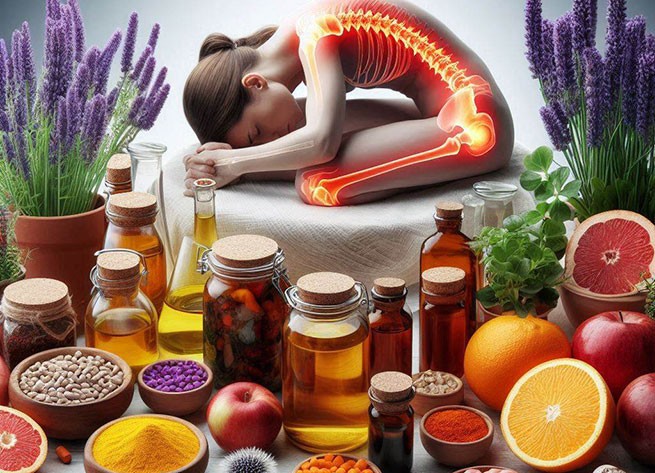Chronic pain is a condition that can affect our daily activities, so we look for ways to support ourselves.
While medications play an important role in pain management, diet plays a key role in relieving or worsening symptoms.
Possible Causes of Chronic Pain
Causes of chronic pain include:
- Inflammatory diseases such as arthritis that lead to joint pain.
- Nerve damage, often associated with diseases such as diabetes.
- Autoimmune diseases such as lupus and multiple sclerosis.
- Musculoskeletal problems, including poor posture or repetitive strain injuries.
- Fibromyalgia is a disorder associated with widespread musculoskeletal pain and fatigue.
What foods help relieve chronic pain
A diet rich in anti-inflammatory foods can significantly reduce the intensity of chronic pain. Here are the most important foods that will help with this:
- Fatty fish: Salmon, mackerel, and sardines are high in omega-3 fatty acids, which reduce inflammation.
- Berries: Blueberries, strawberries, and cranberries are rich in antioxidants that reduce inflammation.
- Leafy green vegetables: Vegetables like spinach, kale, and Swiss chard contain vitamins and minerals that fight inflammation.
- Nuts and seeds: Almonds, flaxseeds, and walnuts are excellent sources of anti-inflammatory omega-3 fats.
- Olive oil: A staple of the Mediterranean diet, it contains oleocanthal, which has anti-inflammatory properties.
- Ginger and Turmeric: These spices have powerful anti-inflammatory and antioxidant activity. Curcumin, the active ingredient in turmeric, has been shown to reduce pain.
- Whole grains: Oats, quinoa, and brown rice are high in fiber, which can help reduce inflammation.
- Cherry: rich in antioxidants, especially anthocyanins, which may reduce muscle pain and inflammation.
- Garlic: contains compounds that may reduce the production of substances that cause inflammation.
Including these foods in a balanced diet may help relieve symptoms of chronic pain.
What Foods to Avoid If You Have Chronic Pain
- Sweet snacks and drinks: Foods high in sugar increase inflammation and should be avoided.
- Processed products: They often contain trans fats and processed sugars, which are linked to inflammation.
- Processed carbohydrates: White bread, baked goods, and other processed carbohydrates can raise blood sugar levels, which leads to inflammation.
- Red and processed meats: These foods are associated with increased inflammation in the body.
- Dairy products: For some people, dairy products can promote inflammation and increase pain.
What is the body's natural pain reliever?
The body's most natural painkiller is endorphins, chemicals produced by the brain that reduce the perception of pain. Various activities can increase endorphin levels:
- Exercises: Physical activity, especially aerobic exercise such as running, swimming, and cycling, triggers the release of endorphins. Yoga and stretching also help relieve tension and stimulate the production of endorphins.
- Massage therapy.
- Acupuncture: This traditional Chinese medicine method can stimulate the production of endorphins and relieve pain.
- Meditation and deep breathing: Self-reflection practices and deep breathing exercises help release endorphins and improve pain tolerance.
- Laughter: releases endorphins, so engaging in enjoyable social activities can help manage pain.
- Listening to music: Research shows that listening to your favorite music can increase the release of endorphins and reduce the perception of pain.
What makes chronic pain worse
- Lack of physical activity: Inactivity can lead to stiff joints and weak muscles, which makes pain worse.
- Chronic stress: High levels of stress can increase muscle tension and make pain worse.
- Bad sleep: Insufficient rest can reduce the body's tolerance to pain and worsen symptoms.
- Unhealthy diet: Eating foods that cause inflammation, such as processed snacks and high-sugar foods, can make chronic pain worse.
- Dehydration: Not drinking enough water can contribute to inflammation and muscle spasms, increasing pain.
Resume
Treating chronic pain requires a multifaceted approach that includes dietary choices, physical activity, and lifestyle changes. By incorporating anti-inflammatory foods into the diet, avoiding irritants, and using techniques that enhance the body’s natural painkillers, patients can control symptoms and improve their quality of life.







More Stories
Expert Opinion: Very Popular Diet Raises Diabetes Risk
Artificial intelligence system capable of diagnosing over 1000 diseases at an early stage
What Happens To Your Body If You Eat Broccoli Regularly